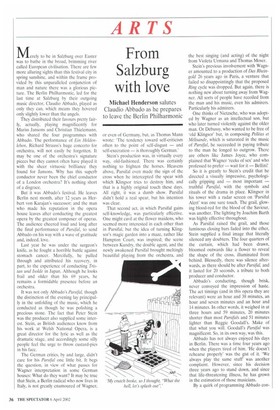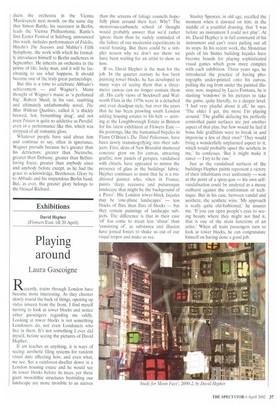From Salzburg with love
Michael Henderson salutes Claudio Abbado as he prepares to leave the Berlin Philharmonic Merely to be in Salzburg over Easter was to bathe in the broad, brimming river called European civilisation. There are few more alluring sights than this festival city in spring sunshine, and within the frame provided by this unparalleled conjunction of man and nature there was a glorious picture. The Berlin Philharmonic, led for the last time at Salzburg by their outgoing music director, Claudio Abbado, played as only they can, which means they hovered only slightly lower than the angels.
They distributed their favours pretty fairly, actually, playing magnificently for Mariss Jansons and Christian Thielemann, who shared the four programmes with Abbado. The performance of Ein Heidenleben, Richard Strauss's huge concerto for orchestra, will not easily be forgotten. It may be one of the orchestra's signature pieces but they cannot often have played it with the sheer virtuosic brilliance they found for Jansons. Why has this superb conductor never been the chief conductor of a London orchestra? It's nothing short of a disgrace.
But it was Abbado's festival. He leaves Berlin next month, after 12 years as Herbert von Karajan's successor; and the man who made his reputation in the opera house leaves after conducting the greatest opera by the greatest composer of operas. The audience cheered loud and long after the final performance of Parsifal, to send Abbado on his way with a wave of gratitude and, indeed, love.
Last year he was under the surgeon's knife, as he fought a horrible battle against stomach cancer. Mercifully, he pulled through and attributed his recovery, in part, to the experience of conducting Tristan und Isolde in Japan. Although he looks frail and older than his 69 years, he remains a formidable presence before an orchestra.
It was not only Abbado's Parsifal, though the distinction of the evening lay principally in the unfolding of the music, which he conducted as though he was polishing a precious stone. The fact that Peter Stein was the producer also supplied some interest. Stein, as British audiences know from his work at Welsh National Opera, is a great director for the lyric as well as the dramatic stage, and accordingly some silly people feel the urge to throw custard-pies in his face.
The German critics, by and large, didn't care for his Parsifal one little bit. It begs the question, in view of what passes for Wagner interpretation in some German houses: What do they want? It may be true that Stein, a Berlin radical who now lives in Italy, is not greatly enamoured of Wagner. or even of Germany, but, as Thomas Mann wrote: The tendency toward self-criticism often to the point of self-disgust — and self-execration — is thoroughly German.'
Stein's production was, in virtually every way, old-fashioned. There was certainly nothing to frighten the horses. Heavens above, Parsifal even made the sign of the cross when he intercepted the spear with which Klingsor tries to destroy him, and that is a highly original touch these days. All right, it was a dumb show. Parsifal didn't hold a real spear, but his intention was clear.
That second act, in which Parsifal gains self-knowledge, was particularly effective. One might cavil at the flower maidens, who seemed more interested in each other than in Parsifal, but the idea of turning Klingsor's magic garden into a maze, rather like Hampton Court, was inspired; the scene between Kundry, the double agent, and the newly awakened Parsifal brought meltingly beautiful playing from the orchestra, and the best singing (and acting) of the night from Violeta Urmana and Thomas Moser.
Stein's previous involvement with Wagner amounted to a production of Das Rheingold 26 years ago in Paris, a venture that failed so disappointingly that the proposed Ring cycle was dropped. But again, there is nothing new about turning away from Wagner. All sorts of people have recoiled from the man and his music, even his admirers. Particularly his admirers.
One thinks of Nietzsche, who was adopted by Wagner as an intellectual son, but who later turned violently against the older man. Or Debussy, who wanted to be free of `old Klingsor' but, in composing Pe'leas et Melisande, which is saturated in the music of Parsifal, he succeeded in paying tribute to the man he longed to outgrow. There are others like James Joyce, who complained that Wagner 'reeks of sex' and who professed to prefer — wait for it — BeRini!
So it is greatly to Stein's credit that he directed a visually impressive, psychologically gripping and — most important — truthful Parsifal, with the symbols and rituals of the drama in place. Klingsor in his tower with a radar screen on `Parsifal Alert' was one sure touch. The grail, glowing blood-red for the blood of the Saviour, was another. The lighting by Joachim Barth was highly effective throughout.
As Parsifal raised the grail, and those luminous closing bars faded into the ether, Stein supplied a final image that literally silenced any doubters. The four quarters of the curtain, which had been drawn, bloomed outwards like a flower to reveal the shape of the cross, illuminated from behind. Blessedly, there was silence afterwards, as there should be after Parsifal, and it lasted for 20 seconds, a tribute to both producer and conductor.
Abbado's conducting, though brisk, never conveyed the impression of haste. The act timings (and in this opera they are relevant) were an hour and 38 minutes, an hour and seven minutes and an hour and 14 minutes. In other words, it weighed in at three hours and 59 minutes, 20 minutes shorter than most Parsifals and 51 minutes lighter than Reggie Goodall's. Make of that what you will. Goodall's Parsifal was magnificent. So, in its own way, was this.
Abbado has not always enjoyed his days in Berlin. There was a time four years ago when the players tired of him. 'He doesn't rehearse properly' was the gist of it. 'We always play the same stuff was another complaint. However, since his decision three years ago to stand down, and since that life-threatening illness, he has grown in the estimation of those musicians.
By a quirk of programming Abbado con ducts the orchestra in the Vienna Musikverein next month, on the same day that Simon Rattle, his successor in Berlin, leads the Vienna Philharmonic. Rattle's first Easter Festival in Salzburg, announced this week, includes performances of Fidelio, Haydn's The Seasons and Mahler's Fifth Symphony, the work with which he formally introduces himself to Berlin audiences in September. He inherits an orchestra in the prime of life, lucky man, and it will be fascinating to see what happens. It should become one of the truly great partnerships.
But this is a time to celebrate Abbado's achievement — and Wagner's. Mann thought of Wagner's music as 'a perfumed fog'. Robert Musil, in his vast, rambling and ultimately unfathomable novel, The Man Without Qualities, called it 'a thickly brewed, hot, benumbing drug', and not even Tristan is quite so addictive as Parsifal, even in a performance like this, which was stripped of all romantic gloss.
Whatever people have said about him and continue to say, often in ignorance, Wagner prevails because he's greater than his detractors: greater than Nietzsche, greater than Debussy, greater than Belliniloving Joyce. greater than anybody since and anybody before except, as he had the grace to acknowledge, Beethoven. Glory be to Abbado and his stupendous Berlin band. But, as ever, the greater glory belongs to the blessed Richard.































































 Previous page
Previous page